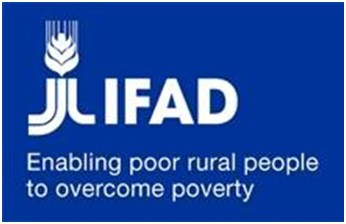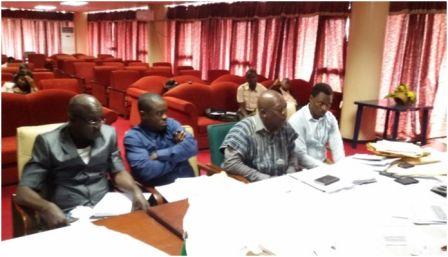Family farming vital for resilient, food-secure future
Rome, 17 February 2014 – As the international community works on a post-2015 development framework that ushers in profound changes in development policy, investment and practice needed for rural transformation, the International Fund for Agricultural Development (IFAD) will welcome delegates from its 172 Member States for the 37th session of its Governing Council on 19-20 February.
The theme of the meeting is “Investing in smallholder family farmers for the future we want” in recognition of this year’s United Nations International Year of Family Farming (IYFF). Recognizing that there can be no food and nutrition security for the 2 billion people who depend on smallholder family farming without inclusive rural development, opinion shapers, policymakers, leaders of farmer organizations and private-sector representatives attending IFAD’s annual meeting will discuss the comparative advantages of family farming and what is needed to better support them.
Fabrizio Saccomanni, Minister for Economy and Finance of the Italian Republic, Abdullah Jummah Alshibly, Assistant Secretary-General for Economic Affairs, Co-operation Council for the Arab States of the Gulf Cooperation Council (GCC) and Paul Polman, Chief Executive Officer (CEO) of Unilever will attend and speak at the Governing Council. IFAD President Kanayo F. Nwanze will deliver the keynote address. Two Memoranda of Understanding, one between IFAD and Unilever and another between the Fund and the GCC, will be signed during the two-day meeting with Member States.
Leading up to discussions around the global development framework to be launched once the Millennium Development Goals expire in 2015, IFAD will host an event on 18 February, with, among others, Gerda Verburg, Chair of the Committee on World Food Security, for a lively discussion on Achieving a sustainable future for all: Rural transformation and the post-2015 agenda. Delegates will explore suitable policies around investing in and empowering smallholder family farmers, rural-urban dynamics, and building the resilience of rural women and men.
These issues will be the focus of a Governors’ roundtable on Investing in smallholder family farmers: Investing in smallholder family farmers for the future we want.
This year’s Governing Council will open with a high-level panel discussion, Spotlight on the International Year of Family Farming, which will bring together farmer leaders and IFAD-funded project participants and stakeholders from Brazil, Colombia, Mali, The Philippines, Syrian Arab Republic and United Republic of Tanzania. Focused on family farming, the discussion will explore issues around investments required to improve productivity and profitability, necessities to achieve food security, and the public policies essential to grow agricultural as a provider of decent employment.
On the closing day, a panel, Small farmers = Big business, will explore private-sector investments in family farming with Unilever’s Polman, Andrew Rugasira, CEO of Good African Coffee and others. The panel’s deliberations will be of particular importance as IFAD explores the use of public-private partnerships in the operations it supports.
Today, the Fund recognizes that a broader approach to programming is essential to fulfilling its mandate. This includes establishing viable backward and forward linkages between rural producers and private markets, which is why IFAD has pledged to increase its support to the development of rural women and men in their role as entrepreneurs. In addition, as the livelihoods of poor rural people are often dependent on other private-sector operators, IFAD will continue to partner with businesses to improve small farmers’ income-generating opportunities. In 2013, for instance, the Fund formed a global strategic partnership with the Intel Corporation to strengthen ICT for Development (ICT4D) in IFAD-funded projects in Asia.
The two-day Governing Council meeting will come on the heels of the Fifth Global Meeting of the Farmers’ Forum on 17-18 February. The biennial forum is an ongoing, bottom-up process of consultation and dialogue between small farmers’ and rural producers’ organizations, IFAD and governments. More than 90 farmer leaders, representing millions of smallholders and rural producers are gathering to celebrate the IYFF and to exchange best practices and challenges with IFAD staff and selected partners.
The United Nations declared 2014 as the International Year of Family Farming to recognize the importance of family farming in the global development agenda. IFAD was the first development agency to formally support the call by civil society and farmer organizations for a year dedicated to family farming. In 2013, IFAD extended a US$500,000 grant to the World Rural Forum to support civil society involvement in 11 countries and five regions; an additional US$150,000 was given to support the facilitation and monitoring of progress during the year.
Family farming, in all of its forms, is the predominant form of agriculture worldwide. These women and men are custodians of vital natural resources and biodiversity, and central to climate change mitigation and adaptation. Despite this reality, they remain a largely untapped resource, and are disproportionately represented among the world’s poor people.
IFAD aims to reach 90 million people over the period 2013 to 2015, and to move 80 million out of poverty over the same period. Accelerating progress towards the goal, results reported in 2013 show that 33 per cent more poor people in rural areas received services from IFAD-supported projects than in the previous year. Women in particular were targeted, accounting for about 50 per cent of participants in IFAD-supported projects. Further, between 2011 and 2012, the total number of borrowers in IFAD-funded projects increased from about 145,000 to nearly 195,000, including more than 82,000 women.
In West Africa, for example, IFAD’s US$16.6 million loan to the Rural Youth Vocational Training, Employment and Entrepreneurship Support Project in Mali will provide support to young people, particularly women, who lack technical and management skills, and give them access to financing to undertake new income-generating activities. In Central Asia, IFAD provided a US$11.0 million loan to the Livestock and Market Development Programme II in Kyrgyzstan, to support livestock producer households, particularly vulnerable households and those headed solely by women. And in the Asia and Pacific region, a US$39.5 million IFAD loan for the Bangladesh Coastal Climate-Resilient Infrastructure Project will strengthen the resilience of smallholder farmers, small traders, micro-entrepreneurs, landless people and women, and increase their food security and incomes.
In 2013, IFAD was honoured with the Momentum for Change Lighthouse Activities award for the US$103.2 million in financing it provided for climate change adaptation efforts in 10 vulnerable countries under the Adaptation for Smallholder Agriculture Programme (ASAP). The IFAD-supported Post-Tsunami Coastal Rehabilitation and Resource Management Programme in Sri Lanka was named “2013 Project of the Year” by the United Nations Office for Project Services.
IFAD remains committed to smallholder and family farming. Both are central to its mission of reducing poverty and hunger in the rural areas of the developing world. Leveraging the wide-ranging potential returns of investing in smallholder family farmers was one of the rationales for the establishment of IFAD in 1977. Over the course of decades, IFAD has invested more than US$15 billion in grants and low-interest loans to create vibrant rural communities; investment in smallholder family farming has been an essential aspect of this work.
IFAD
Stay with Sierra Express Media, for your trusted place in news!
© 2014, https:. All rights reserved.




